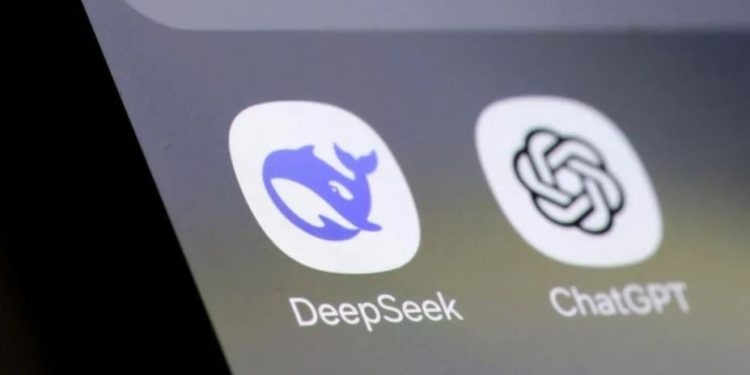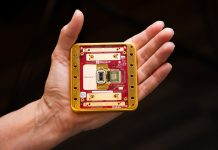The rapid rise of China’s DeepSeek AI has sent shockwaves through the global technology industry, rattled markets, and shaken the perception of American superiority in artificial intelligence.
Venture capitalist Marc Andreessen captured the moment perfectly, calling DeepSeek-R1 “AI’s Sputnik moment” in a post on X. The app’s impact has been profound, dominating Apple’s US App Store as the most downloaded free app over the weekend. By Monday, it had sparked a massive sell-off in major tech stocks, raising fears about America’s leadership in the AI sector.

Nvidia, a key player in AI chip design, experienced a staggering 17% drop in share value, losing nearly $600 billion in market capitalization—an unprecedented decline in U.S. stock market history, according to Bloomberg.
The crux of the disruption lies in cost. DeepSeek’s developers claim to have built their latest AI model for just $5.6 million—a fraction of the billions spent by AI giants like OpenAI, Google, and Anthropic. In stark contrast, OpenAI reportedly spent $5 billion last year alone.
The bold cost-efficiency claims have sparked skepticism in Silicon Valley. Veteran analyst Gene Munster questioned the financials, speculating whether DeepSeek’s operations are subsidized or if the numbers are accurate.
As analysts and investors scramble to make sense of this development, some view it as a potential buying opportunity, while others remain cautious about the app’s long-term implications. For now, DeepSeek has undeniably disrupted the industry, leaving Silicon Valley on edge and America’s tech dominance under scrutiny.
The chatbot is “surprisingly good, which just makes it hard to believe”, he said.
Regardless, DeepSeek’s sudden arrival is a “flex” by China and a “black eye for US tech,” to use his own words.
It was just last week, after all, that OpenAI’s Sam Altman and Oracle’s Larry Ellison joined President Donald Trump for a news conference that really could have been a press release.The event represented peak American bullishness on AI.
They announced Stargate, a joint venture that promises up to $500bn in private investment for AI infrastructure: data centers in Texas and beyond, along with a promised 100,000 new jobs.
The US seemed to think its abundant data centers and control over the highest-end chips gave it a commanding lead in AI, despite China’s dominance in rare-earth metals and engineering talent.
Some have even seen it as a foregone conclusion that America would dominate the AI race, despite some high-profile warnings from top executives who said the country’s advantages should not be taken for granted.
The US may still go on to command the sector, but there is a sense that DeepSeek has shaken some of that swagger.
Trump’s words after the Chinese app’s sudden emergence in recent days were probably cold comfort to the likes of Altman and Ellison. He called this moment a “wake-up call” for the American tech industry, and said finding a way to do cheaper AI is ultimately a “good thing”.
It is also worth noting that it was not just tech stocks that took a beating on Monday. Energy stocks did too. DeepSeek’s arrival on the scene has upended many assumptions we have long held about what it takes to develop AI.
Maybe that nuclear renaissance – including firing up America’s Three Mile Island energy plant once again – won’t be needed. Maybe it does not take so much capital, compute, and power after all. For now, the future of semiconductor giants like Nvidia remains unclear.
DeepSeek says its model was developed with existing technology along with open source software that can be used and shared by anybody for free.
But WIRED reports that for years, DeepSeek founder Liang Wenfung’s hedge fund High-Flyer has been stockpiling the chips that form the backbone of AI – known as GPUs, or graphics processing units.
The company has said its models deployed H800 chips made by Nvidia. US policy restricting sales of higher-powered chips to China might get a second-look under the new Trump administration.
OpenAI’s Sam Altman was mostly quiet on X Monday. But very late in the day, he wrote that DeepSeek was “impressive… particularly around what they’re able to deliver for the price”.
“We will obviously deliver much better models and also it’s legit invigorating to have a new competitor!” he wrote.
It was Sputnik that truly ushered in the space age. There, too, the US was caught off guard. How its tech sector responds to this apparent surprise from a Chinese company will be interesting – and it may have added serious fuel to the AI race.























































![[FREE FREE MONEY] Predict and Win a Guaranteed GH¢200 From Us EVERY WEEK](https://wordpress.ghanatalksradio.com/wp-content/uploads/2022/02/Predict-and-Win-Final-09-03-2021-218x150.jpg)
![[Predict & Win – 8th/Oct.] WIN A Guaranteed ¢200 From Us This Week](https://wordpress.ghanatalksradio.com/wp-content/uploads/2021/10/maxresdefault-16-218x150.jpg)
![[Predict & Win – 2nd] WIN A Guaranteed ¢200 From Us This Week](https://wordpress.ghanatalksradio.com/wp-content/uploads/2021/09/maxresdefault-50-218x150.jpg)
![[Predict & Win – 25th] WIN A Guaranteed ¢200 From Us This Week](https://wordpress.ghanatalksradio.com/wp-content/uploads/2021/09/maxresdefault-36-218x150.jpg)
![[Predict & Win – 18th] WIN A Guaranteed ¢200 From Us This Week](https://wordpress.ghanatalksradio.com/wp-content/uploads/2021/09/maxresdefault-23-218x150.jpg)








![[National cathedral] See full list of churches that have contributed since 2018](https://wordpress.ghanatalksradio.com/wp-content/uploads/2020/09/Ghana-National-Cathedral-GhanaTalksRadio-100x70.jpg)



